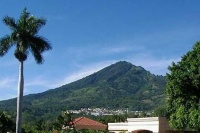
| El Salvador |
 |

Click here for more photos of El Salvador
El Salvador is a land of amazing contrasts, accented by a long string of cone-shaped volcanoes and their tranquil mountain lakes. In addition, the country's Maya ruins are considered some of the most interesting in all of Central America.
Significant points-of-interest include Cerro Verde National Park and the Santa Ana and Izalco volcanoes; the cloud forests of Montecristo National Park; Mayan ruins at Tazumal; El Espino and El Cuco beaches along the Pacific Ocean; shopping and night life venues in San Salvador; the colonial architecture, splendid churches and colorful handicraft markets spread across the country, and of course, the indigenous native celebrations and religious festivals that fill the calendar.
Over the last ten years, the country has instigated a strong move toward democracy, countrywide modernization, and an greatly improved tourism industry. They look forward to providing Americans with a medical tourism option.
El Salvador is located in Central America and can be reached from most US cities within 3 to 7 hours.
MedRetreat offers service to Escalon / San Benito

ESCALON / SAN BENITO
Hotel Accommodations
ESCALON / SAN BENITO
Traveler Support
Country Information
El Salvador is located in Central America. It has a total area of 8,123 square miles, making it comparable in size to the state of Massachusetts. El Salvador is the smallest country in Central America. Due to its size it is affectionately called the "Tom Thumb of the Americas". It has 123.6 square miles of water within its borders. Several small rivers flow through El Salvador into the Pacific Ocean, including the Goascorán, Jiboa, Torola, Paz and the Río Grande de San Miguel. Only the largest river, the Lempa River, flowing from Honduras across El Salvador to the ocean, is navigable for commercial traffic.
Volcanic craters enclose lakes, the most important of which are Lake Ilopango (27 sq mi) and Lake Coatepeque (10 sq mi). Lake Güija is El Salvador's largest natural lake (17 sq mi). Several artificial lakes were created by the damming of the Lempa, the largest of which is Embalse Cerrón Grande (135 sq mi).
El Salvador shares borders with Guatemala—126 miles (203 km) and Honduras—212.5 miles (342 km), and is the only Central American country that does not have a Caribbean coastline. The highest point in the country is Cerro El Pital at 8,957 feet (2,730 meters).
El Salvador's population numbers about 6.9 million people. Fully 90% are mestizo (mixed Amerindian and Spanish/European), 9% white (mostly Spanish, but also some French, German and Italian descent), and only 1% indigenous. [top]
Language
Spanish is the official language of El Salvador. English is the second language. [top]
Religion
Roman Catholic 83%, Protestant & other 17%. [top]
Climate
Tropical and subtropical; dry season (November through April); rainy season (May through October); cooler in highlands. El Salvador's weather is influenced by altitude. Pacific lowlands are uniformly hot; central plateau and mountain areas more moderate. The temperature in San Salvador area ranges from a high of 74-100 degrees Fahrenheit, to a low of 54-74 degrees Fahrenheit. The wet season is from May to October. The hottest months are March and April.
El Salvador has a tropical climate with pronounced wet and dry seasons. Temperatures vary primarily with elevation and show little seasonal change. The Pacific lowlands are uniformly hot; the central plateau and mountain areas are more moderate.
The rainy season, known locally as invierno, or winter, extends from May to October. Almost all the annual rainfall occurs during this time, and yearly totals, particularly on southern-facing mountain slopes, can be as high as 78 inches. Protected areas and the central plateau receive lesser, although still significant, amounts. Rainfall during this season generally comes from low pressure over the Pacific and usually falls in heavy afternoon thunderstorms. Although hurricanes occasionally form in the Pacific, they seldom affect El Salvador.
From November through April, the northeast trade winds control weather patterns. During these months, air flowing from the Caribbean has had most of the precipitation wrung out of it passing over the mountains in Honduras. By the time this air reaches El Salvador, it is dry, hot, and hazy. This season is known locally as verano, or summer.
Temperatures vary little with season; elevation is the primary determinant. The Pacific lowlands are the hottest region, with annual averages ranging from 77°F to 85°F. San Salvador is representative of the central plateau, with an annual average temperature of 74°F and absolute high and low readings of 100°F and 45°F, respectively. Mountain areas are the coolest, with annual averages from 54°F to 74°F and minimum temperatures sometimes approaching freezing. [top]
Clothing
The first thing to consider when packing for your medical travel trip is climate. The dress code in El Salvador is casual. Professionals usually wear light cotton suits. The popular "guayabera" or embroidered cotton shirt, is preferred casual wear for men, particularly in the warmer areas. As a health tourism guest, just wear very loose, comfortable clothing. . [top]
Mobile Phones
A Subscriber Identity Module Card (SIM Card) is now available for El Salvador and foreign patients who are traveling for medical purposes. The SIM Card must be used in conjunction with a Digital GSM mobile phone within the 900-MHz range or a Digital PCN mobile phone within the 1800-MHz range. [top]
Getting Online & Checking E-mail
All of El Salvador's leading hotels offer facsimile (fax) and e-mail services. Numerous private businesses offer such facilities, most often in conjunction with translation services. El Salvador has been expanding its information service for residents and tourists alike through the Internet system. Services are now available at El Salvador's leading hotels and at the many "cyber cafés" that are cropping up in all major tourist destinations. [top]
Emergency Telephone Numbers
Emergency: 911
Ambulance: 2222-5156
Fire: 2233-7300
US Embassy: 2278-6011 or 2278-8806
Directory Assistance: 114 [top]
| |
 |
 |
| |
|
| | |
|
|